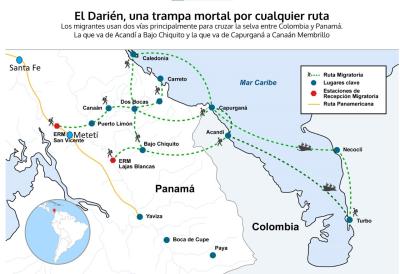
The signed agreement between the U.S. and Panama committing $6 million from the United States to deport migrants trying to cross the Darien rainforest is a disgrace. Instead of solving anything, this money violates the basic human rights of people fleeing conflict-ridden zones to seek asylum and a better future up North. We need constructive measures to alleviate this humanitarian crisis, actions and investments that are directed at the root causes of immigration rather than using this dramatic situation to score political points.
Migrants who are risking their lives to cross through the Darien, at the border between Colombia and Panama, are left with no other option. They are so desperate to escape from the gang violence and lack of economic opportunity in their home countries, and they lack the resources to avoid the long journey through the jungle. The installation of barbed wire fences by the newly elected Panamanian government is another failed initiative which serves as a photo op to justify further funding from the U.S. government.
These funds would be much better allocated if they dealt with what is fueling the out-of-control violence that is plaguing Latin American nations: the (legal and illegal) flooding of guns and ammunition from the U.S. If the U.S. government wants to reduce immigration at its Southern border, it first needs to control the flow of military-graded weapons and ammunition that end up in the hands of gangs and cartels.
Another counterproductive measure are the sanctions imposed on countries producing some of the immigration in Latin America: Venezuela and Nicaragua. These sanctions might be aimed at the governing class, but they hit the common folk already suffering from economic hardships, triggering even further migration up North. Let’s not forget that migrants don’t abandon their homeland by choice, but by necessity. We ask that these policies be halted at once and monies invested in helping build prosperity and peace in Latin American nations as this will yield results the world is longing for.
You can our joint statement on border externalization HERE.

